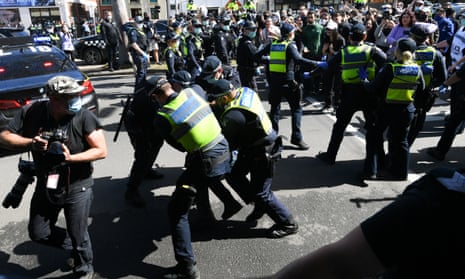An increased threat of far-right violence and lingering Islamic State influence amid the Covid-19 pandemic should be the catalyst for a new approach to countering violent extremism, experts have said.
The push comes as the UK launches a program – largely based on Australian research – to encourage reporting of possible extremism, regardless of ideology.
Prof Michele Grossman researched the barriers for people sharing information with authorities about concerns that a friend, spouse or family member may be radicalising, and found that often it was fear that a loved one would be prosecuted that prevented reporting.
The UK program, ACT Early, came after a study she had done with Australian families was replicated in the UK. Grossman was an academic adviser for the development of the ACT Early model.
“It’s just as relevant to someone who might be radicalising to rightwing extremism, or incel thinking, or any other variety,” Grossman said.
“But the really big change is around the empathy, the support, the understanding. You have, rather than a policing approach, an approach that is about how we can work with you to help the ones you love.”
Prevent, the UK’s controversial main program for dealing with potential extremists before they cross a criminal threshold, is currently subject to an independent review, which is expected to consider several issues including its collection of data and the training of its officers.
In announcing ACT Early, UK authorities denied it was a replacement for Prevent but said it would target young people who may have been spending more time online during the pandemic to stop them from radicalising to violence.
Since January 2019, 17 children had been arrested in the UK in relation to terrorism offences, most of whom were radicalised entirely online.
“What concerns me most is this: there has been a sharp increase in extremist material online in the last few years, and Covid-19 has meant that vulnerable people are spending a lot more time isolated and online, and with fewer of the protective factors that schooling, employment, friends and family can provide,” Assistant Commissioner Neil Basu, the head of UK counter terrorism policing, said.
Grossman, from Deakin University, said encouraging reporting remained a vexing challenge, but it was important authorities had multiple tools available to detect extremists, especially when it came to uncovering lone actor attacks such as the Christchurch massacre.
She said it was time to reconsider what had been the standard approach for at least a decade of authorities handling community reporting of concerns about radicalisation through a predominantly “securitised” lens.
“Police and government measures, for example through surveillance or ‘watch lists’ of persons of interest, cannot be relied on in isolation,” she said.
“[They] will never be able to detect the full potential array of specific emerging threats or copycat actions that Christchurch and events like it may fuel.
“It is false hope to assume that governments can be held wholly responsible for the emergence of terror linked to a range of flashpoints in our midst.”
Australia’s approach to reporting suspected extremism and deradicalisation remains a blend of federal and state initiatives, often run in conjunction with police forces or prison authorities.
Rightwing extremism, which some experts believe has received a boost during the pandemic, is emerging as a threat in Australia, albeit at a less organised level than detected in the UK, US and other parts of Europe.
Asio’s deputy director general of intelligence service delivery, Heather Cook, told a parliamentary inquiry in September that rightwing extremism now accounts for 30-40% of the spy agency’s counter-terrorism work, up from 10-15% before 2016.
Grossman said while some programs, such as Step Together, which is being used in New South Wales, advocated a similar model to the UK’s ACT Early program, there was scope for expansion.
A Senate estimates hearing last month also heard that the Living Safe Together intervention program worked with people regardless of ideology, with about 80% referred for concerns with Islamic extremism and 20% referred for far-right views.
Hass Dellal, the executive director of the Australian Multicultural Foundation, said that the involvement of community leaders in developing the ACT Early program improved its chance of success.
“If you want someone to have confidence in your service, you have to have community groups and leaders to advocate for it.
“Otherwise they will see it as a government tool for data collection or surveillance or whatever else.
“They’re not sure what it is, where does the information go, and how is it used … [you have to] break down that fear that they’re being targeted.”
A Department of Home Affairs spokesman said a range of approaches were taken to tackling radicalisation, including referring extremist material to social media platforms and requesting its removal.
“While Covid-19 may have increased the likelihood that people are vulnerable to violent extremism and radicalisation, our programs are designed to apply regardless of religious, ideological or political motive,” the spokesman said.
